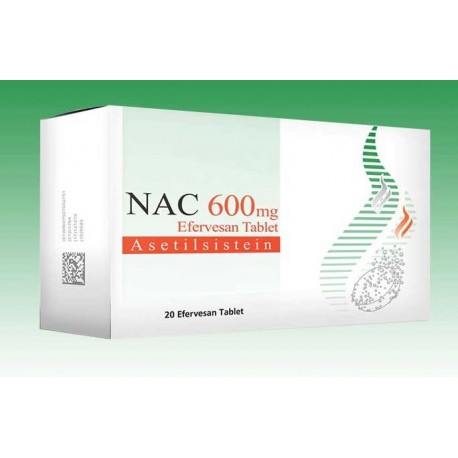Volume discounts
| Quantity | Discount | You Save |
|---|---|---|
| 2 | 5% | Up to $2.70 |
| 3 | 10% | Up to $8.10 |
| 4 | 15% | Up to $16.20 |
| 5 | 20% | Up to $27.00 |
More info
1. What is NAC and what is it used for?
NAC are white, round notched tablets. 20 effervescent tablets are packed in a polyethylene cap, in a polypropylene tube package and in a cardboard box, together with the instructions for use.
NAC is a drug that is used by drinking after it is completely dissolved in water.
NAC contains acetylcysteine as an active ingredient. Acetylcysteine is a cysteine derivative agent, which is an amino acid. It has an expectorant effect.
NAC is a mucolytic (sputum, mucus breakdown) drug used in the treatment of bronchopulmonary (bronchial and lung) diseases, bronchial secretion (respiratory tract secretion) disorders in cases where the removal of dense sputum, reduction of sputum, regulation of its density, facilitation of expectoration (excretion of sputum). It is also used to prevent liver failure that occurs due to high doses of paracetamol intake.
NAC reduces sputum formation in the case of colds and inflammation of the airways (bronchitis). It dilutes the sputum and makes it easier to cough.
3.How to use NAC?
Instructions for appropriate use and dose / frequency of administration
Unless otherwise recommended by the doctor, the prescribed dose for NAC is as follows:
Adolescents and adults over the age of 14
1 effervescent tablet (400 mg-600 mg a day) is used 2-3 times a day.
Children between the ages of 6-14
1 effervescent tablet (400 mg per day) is used twice a day.
For children aged 2-5 years
Half a tablet 2-3 times a day (200 mg-300 mg a day) is used.
In paracetamol poisoning:
The loading dose is 140 mg / kg and the maintenance dose is 70 mg / kg every 4 hours (17 doses in total).
at1
Always follow your doctor's instructions when using NAC. If you are not sure, ask your doctor or pharmacist.
• NAC should not be used for longer than 4-5 days unless otherwise recommended by the doctor.
• Do not exceed the recommended dose.
• Depending on your response to treatment, your doctor may recommend a higher or lower dose.
• Do not change the dose or stop treatment without talking to your doctor.
• Patients under antibiotic treatment should take NAC 2 hours before or after taking the antibiotic.
Application route and method
• NAC is for oral use only.
• NAC is drunk by dissolving it in a glass of water after meals. The drug prepared for use by dissolving in water should be drunk without waiting. Effervescent tablets should not be chewed and swallowed.
Different age groups
Use in children
It should be given to children under the age of 2 only with the recommendation of a doctor and under the control of a doctor.
Acetylcysteine can be administered in infants and children under 1 year of age only in vital situations and by a doctor.
Special use cases
It can be used in high doses under physician control in paracetamol poisoning. Kidney / Liver failure:
Use in the elderly
• If you have kidney or liver disease, consult your doctor before using NAC.
• In order to be sure that the drug is effective, it is important for the doctor to follow the progress during regular medical check-ups.
• Unless your doctor recommends otherwise follow these instructions.
• Your doctor will tell you how long your treatment will take with NAC. Do not stop treatment early because stopping NAC treatment may make your disease worse.
If you have an impression that the effect of NAC is too strong or too weak, talk to your doctor or pharmacist.
If you use more NAC than you should
If you have used more than you should use from NAC, talk to a doctor or pharmacist.
If you forgot to use NAC
Don't worry. If you forget to take NACT, take it immediately as you remember. As you remember, if the time to take the next dose is close, skip this dose and take the incoming dose on time and continue normal use.
Do not take a double dose to make up for forgotten doses.
Effects that may occur when treatment with NAC is terminated
Stopping NAC therapy can make your disease worse.
Do not stop taking your medication without consulting your doctor.


